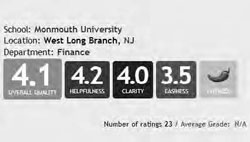Technology has enabled University students to measure the quality of their professors with the use of RateMyProfessors.com. The website, which features online professor ratings, is a popular destination many students utilize when creating their class schedules.
“Users have added more than 14 million ratings, 1.3 million professors and 7,000 schools to RateMyProfessors.com. User-generated content makes RateMyProfessors.com the highest trafficked site for quickly researching and rating professors,” the website states. “More than 4 million college students each month are using Rate My Professors.”
Different categories on the website allow students to get a better understanding of each professor listed. Categories such as department, overall quality, helpfulness, clarity, easiness, and even hotness are listed for each professor. Scores from 1.0 to 5.0 are given, with 5.0 being the perfect score.
Students generally use the site as a means to help them create a schedule with “the best” professor possible for a specific class.
“I, like many of my classmates at Monmouth, use RateMyProfessors.com to get a general idea of professors. If a lot of the reviews are terrible, one might drop or not sign up for a class to begin with,” Erin Comiskey, a freshman health studies major, said.
Comiskey added that although she finds most of the information to be accurate, students should speculate the reasons behind the ratings and comments.
“I do keep in mind that the students who post reviews are outliers,” Comiskey continued. “They are usually students who loved or hated the teacher because very few people are going to go out of their way to write a review about an average quality professor,” she said.
Students are not the only ones taking a look at the website. Professors are noticing the comments as well, and agree that different factors must be taken into consideration when reviewing the ratings.
“In terms of accuracy, I would say it really depends,” Mary Harris, a specialist professor in communication, said. “As with any online ratings or reviews, sometimes people have one bad experience and then that is what they focus on, but in other instances, people approach their evaluations fairly and honestly.”
Harris explained that a professor can receive negative ratings on the site; however, it does not always mean it will correspond with each student.
Dominick Mascitelli, a junior political science major, said, “A professor [on the website] had a low rating because he was a tough grader; he ended up being one of my favorite professors. He does grade hard but he’s a great professor.”
Meaghan Wheeler, a freshman psychology and school counseling major, said she found the ratings to be mostly accurate in relation to her professors by focusing on the overall score.
The website also gives an overall measurement of the college or university’s professors as a whole, as well as the number of professors teaching at the school.
Comiskey stated that the ratings can be both harmful and helpful to the professors because they receive evaluations of their teaching. “When teachers catch wind of their reviews they are either flattered or disrespected. Sometimes, however, I think a few teachers get constructive criticism from it and improve next semester,” she said.
Although the professors are able to evaluate themselves through the comments, and the students are able to get an idea of each professor before taking the class, the students feel that not all of the site’s categories are necessary.
Wheeler and Comiskey agree that the “hotness” category is irrelevant. Comiskey said that it is “unprofessional and does not tell whether or not a professor is actually good at her or his job.”
Regardless of this slightly inefficient aspect of RateMyProfessors.com, the website can still be useful. Wheeler said, “I love the website; I use it every time I schedule a class.”
IMAGE TAKEN from ratemyprofessors.com



